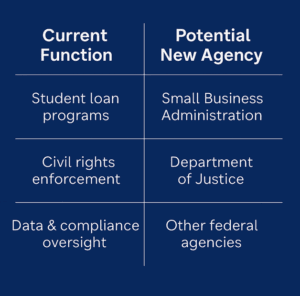
180 Interstate North Parkway
Suite 550, Atlanta, GA 30339
The question for presidents, CFOs, enrollment leaders, and financial aid directors isn’t whether change is coming—it’s how to prepare for it now.
While the Department of Education has historically focused much of its resources on K–12, it has supported higher education in four critical ways:
Billions in aid: Disbursing loans, grants, and work-study dollars
Civil rights enforcement: Ensuring compliance on campuses
Data insights: Gathering and analyzing student data for policy and trends
Accreditation oversight: Safeguarding eligibility for federal aid
But today, the ground is shifting. Conversations in Washington suggest that these functions could be redistributed:

For institutions with strong cash reserves, delayed federal disbursements may be inconvenient but manageable. For schools already operating with tight budgets, disruptions to aid flow could present serious financial risks—potentially affecting payroll, vendor contracts, and, most critically, student enrollment.
Another looming challenge? The loss of a centralized knowledge hub. The Federal Student Aid Office (FSA) is a trusted resource for interpreting policies and answering compliance questions. Splitting its functions among multiple agencies could create confusion and slow down response times—exactly when clarity is needed most.
To weather this period of instability, campus leaders need to act before the disruption reaches a tipping point:
| Action | Why It Matters |
|---|---|
| 1. Build Contingency Plans | Model operational and cash flow scenarios in case federal aid is delayed. |
| 2. Secure Expertise | Partner with financial aid compliance experts to interpret shifting regulations quickly. |
| 3. Strengthen State-Level Relationships | Build connections with state authorities to anticipate new responsibilities and compliance expectations. |
| 4. Monitor Federal Developments | Stay informed on HEA discussions—changes here will have the broadest ripple effects. |
This shake-up is not just an operational issue—it’s a leadership moment. Institutions that proactively plan for disruption, cultivate expert insight, and maintain agility in their operations will be better positioned to safeguard their financial health and their students’ trust.
Change is inevitable. Strategic readiness is optional.

180 Interstate North Parkway
Suite 550, Atlanta, GA 30339
 Shifting Ground Part 2: Financial Aid and the New Economics of Aid
Shifting Ground Part 2: Financial Aid and the New Economics of AidThis site uses cookies. By continuing to browse the site, you are agreeing to our use of cookies.
Accept settingsWe may request cookies to be set on your device. We use cookies to let us know when you visit our websites, how you interact with us, to enrich your user experience, and to customize your relationship with our website.
Click on the different category headings to find out more. You can also change some of your preferences. Note that blocking some types of cookies may impact your experience on our websites and the services we are able to offer.
These cookies are strictly necessary to provide you with services available through our website and to use some of its features.
Because these cookies are strictly necessary to deliver the website, refusing them will have impact how our site functions. You always can block or delete cookies by changing your browser settings and force blocking all cookies on this website. But this will always prompt you to accept/refuse cookies when revisiting our site.
We fully respect if you want to refuse cookies but to avoid asking you again and again kindly allow us to store a cookie for that. You are free to opt out any time or opt in for other cookies to get a better experience. If you refuse cookies we will remove all set cookies in our domain.
We provide you with a list of stored cookies on your computer in our domain so you can check what we stored. Due to security reasons we are not able to show or modify cookies from other domains. You can check these in your browser security settings.
We also use different external services like Google Webfonts, Google Maps, and external Video providers. Since these providers may collect personal data like your IP address we allow you to block them here. Please be aware that this might heavily reduce the functionality and appearance of our site. Changes will take effect once you reload the page.
Google Webfont Settings:
Google Map Settings:
Google reCaptcha Settings:
Vimeo and Youtube video embeds:
You can read about our cookies and privacy settings in detail on our Privacy Policy Page.
